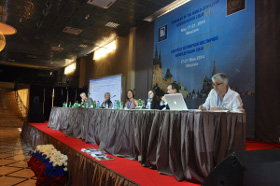CIBJO’s Sector B and C, which respectively deal with manufacturing and technology, and distribution at retail, met jointly at the CIBJO Congress in Moscow, and had as their themes security, jewellery manufacturing and Corporate Social Responsibility.
The meeting was led by Sector B’s Executive Vice President, Simon Rainer, who also serves as CEO of the British Jewellers’ Association.
The first speaker, Nigel Paxman, the CEO of secured transportation and logistics company Malca-Amit, described security as a subject that posed different challenges from country to country, city to city, and even on different streets. He said that although Western Europe was regarded as a generally safe place, it had suffered major, multi-million dollar thefts.
He cited the Brussels airport heist of February 2013 with the theft of $50 million in valuables, including diamonds. He also said there had been high-profile heists in London, Cannes, and further afield there had been unconventional thefts in Dubai and Hong Kong.
Mr. Paxman said criminals were daring and original in their approach, meaning the jewellery industry had to remain constantly vigilant. There had been thefts of expensive diamonds at trade shows that had taken place in as little as three seconds. In addition, jewellers had to be particularly observant and watchful when doing business with new potential clients.
Mr, Paxman said the jewellery was being aided by cutting-edge software and devices on the market that had previously only had military applications, while armoured vehicles had also become increasingly sophisticated in recent years.
He closed by urging jewellers to pack their precious stones and jewellery extremely carefully when dispatching them via air. “The airlines do not handle your goods with kid gloves in the way that we do. They throw the packages around despite them being valuables. This can cause scratches and damage to the goods inside the parcels if they are not packed properly.”
Speaking on the subject of jewellery manufacturing was Gay Penfold, Centre Manager Jewellery Industry Innovation Centre (JIIC), Birmingham, in the United Kingdom. The theme of her speech was innovations in jewellery design and manufacturing.
She explained how the JIIC supports a wide cross section of industry through its research, knowledge transfer activities, training, mentoring and industry focused collaborative consultancy and projects. JIIC provides expert help in the use of highly complex CAD/CAM computerised design programmes, and laser technologies.
The centre’s clients include designer makers and start up businesses, small to medium size enterprises and large companies with a global presence from a wide range of industries, including architecture, animation, automotive, jewellery and silversmithing, micro engineering, museums, product and furniture design.
Professor Marylyn Carrigan, Co-Director of The Centre for Trust and Ethical Behaviour at the Coventry University Business School in the United Kingdom described how many firms had been hit by a consumer backlash after being discovered to have behaved in a way that was regarded as not being in the spirit of CSR. In addition, the proliferation of media channels meant poor corporate behaviour was likely to be widely reported, including on social media.
Professor Carrigan summarised CSR as being honest, doing no harm, being trustworthy and having a cooperative approach to competitors.
Ethical jewellery maker and seller Vivien Johnston, who established Fifi Bijoux, and is also a campaigner for ethical gold, spoke about her approach to business. After graduating from Glasgow School of Art, she became head of design for a commercial jewellery company. “They put me in charge of sourcing, and I didn’t like what I saw.”
She said she campaigns for the rights of mineral workers, and her label does not use gold, silver and platinum mined with cyanide and mercury.
Meanwhile, well-known campaigner Greg Valerio spoke on the issue of Fairtrade gold. By buying Fairtrade gold you are making a difference to the lives of small scale artisan miners and their communities, he said.
Mr. Valerio said that Fairtrade International is the world’s first independent ethical certification scheme for gold, and comes exclusively from artisanal and small-scale miners. He described how miners must meet standards on safety, worker rights and the environment, and that buying Fairtrade gold makes a substantial difference to the lives of miners, their families and their communities.
Buying jewellery with the Fairtrade gold stamp means you know the small-scale and artisanal miners were paid a fair price, which gives them financial security. They also receive an extra amount of money to invest in building the future of their families and their communities, through education, medical care or environmental projects, he said.
The final speaker of the session was Willie Hamilton, Sector C Executive Vice President and CEO of The Company of Master Jewellers in the United Kingdom. He called for a change in the attitude of the trade.
“The best thing to do if you want to find out is simply to ask. What are you selling, and where is it from. These are questions that you must be asking in order to be an ethical and transparent business, Mr. Hamilton said
Photo Caption: The Sector B and C session in session at the CIBJO Congress in Moscow.

